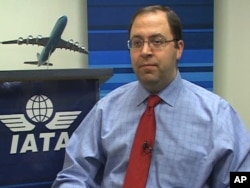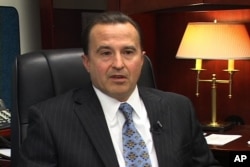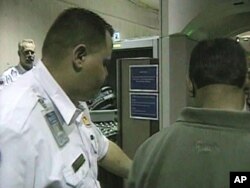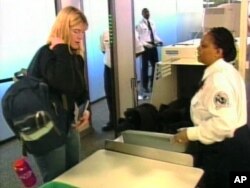Despite several high profile attempts to blow up airplanes, and heightened security measures and hassles at the airports, more Americans are flying than ever before. And it's not just in the skies: ridership aboard America's Amtrak rail service is also rising.
This year, the U.S. Transportation Security Administration will spend $1 billion on security, twice what it spent in 2009. But the airline industry is spending much more.
"Airlines around the world pay $5.9 billion annually for security," says Steve Lott of the International Air Transport Association. "Money that might go into security upgrades on an airplane like securing the cockpits doors, crew training for security issues."
Lott says a big but largely hidden part of that cost is handling data and data exchange. "Airlines have to transmit passenger lists in their passenger manifest to the government because the government checks passengers against watch lists and no-fly lists."
But how does terrorism change people's travel habits, such as on December 25, 2009, when a 23 year-old Nigerian, Umar Farouk Abdul Mutallab, allegedly tried to ignite a bomb on a U.S.-bound airliner?
That's a question Mike McCormick, executive director of the National Business Travel Association, put to members of his organization. "When we talked to them about that event and would they change their behavior, only two percent said they would change their travel habits in some way."
Bruce McIndoe is the president of iJET Intelligence Risk Systems. He says the layers of security added in response to attacks translates into billions of dollars in labor and equipment. "Once security is stepped up, that causes flight delays in the system," he says, "and those delays run into the hundreds of millions of dollars for the airlines dealing with personnel [and] equipment that is not actively generating revenue because it's sitting on the ground, waiting for things to happen."
Bad weather can have the same effect on airline productivity: planes sit, nothing moves, business stops.
Terrorism aimed at airlines has the same dampening effect as an accident, according to airline attorney Roy Goldberg - though both happen, people still believe airline travel is very safe. "Even with the underwear bomber in December," says Goldberg, "airline prices, shares, stock prices actually went up five persent in January. The fourth quarter of 2009 was better than 2008. I think the industry realizes these are short term problems."
Recessions and travel costs affect travelers' decisions as much as anything else. Analysts say an actual act of terrorism does not cost an airline as much in lost business as does the price of trying to prevent terrorism. And, they say, airlines fear that in response to heightened security measures, travelers could begin to change where they go and how they get there.
"If we get to a point where screening is much more invasive - where we require much greater background checks, people are going to start asking, 'What do I do with my family, what do I do with my spare time?'" says David Grier of George Washington University.
Grier says that when travelers begin to question the logic of flying on commercial airlines, they will start to look at other ways to get to their chosen destinations.
You can watch this, and all of Philip's "Money In Motion" reports here.







